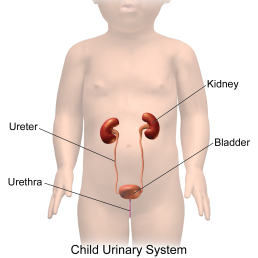The urinary system is governed by the kidneys, two bean-shaped organs that help the body eliminate waste via urine. The two kidneys are located at the base of the abdominal cavity on either side of the spine. The urine produced by the kidneys drain through ureters into the urinary bladder in the pelvis. The bladder is emptied by a single urethra, which exits the body. Over time, damage to the kidneys due to diet, hydration, medications and comorbidities can lead to kidney failure.
 The kidneys are essential for homeostasis of the body’s extracellular fluids. Their essential functions, include:
The kidneys are essential for homeostasis of the body’s extracellular fluids. Their essential functions, include:
- Maintaining overall body fluid balance and regulation of extracellular fluid volume. The kidneys ensure an adequate quantity of plasma to keep blood flowing to vital organs.
- Regulation of osmolarity. The kidneys keep extracellular fluid from becoming too dilute or concentrated.
- Regulation of ion concentrations. The kidneys are responsible for maintaining balanced levels of ions including sodium, potassium and calcium.
- Regulation of pH. The kidneys balance blood plasma acid – base balance.
- Excretion of wastes and toxins. The kidneys filter out a water-soluble waste products and environmental toxins.
- Production of hormone erthryopoietin, which stimulates red blood cell synthesis, and renin, which controls salt and water balance and blood pressure.
- In Ayurveda the udakavaha srotas control fluid levels and require properly functioning apana vayu for waste elimination and prevention of shotha (swelling).
- The kidneys, in traditional Chinese medicine (TCM), are considered the root of life, responsible for vital functions in the body. Kidneys store what is called “essence” derived from each parent, established at birth, that determines our health and vitality throughout our life, in TCM, the kidneys govern water, bones, will power, birth, growth, reproduction, development and sexual health.
According to the American Kidney Fund, over 31 million Americans have chronic kidney disease. Common kidney conditions and causes of chronic kidney disease includes:
- Kidney stones. A small stone forms in the kidney when certain chemicals and crystal-forming substances such as calcium, oxalate and uric acid build up.
- Calcium oxalate kidney stones are due to oxalate, a naturally occurring substance found in food. Oxalate and is also made by your liver. Dietary factors, high doses of vitamin D, intestinal bypass surgery and several metabolic disorders can increase the concentration of calcium or oxalate in urine.
- Struvite stones form in response to an infection, such as a urinary tract infection.
- Uric acid stones form in people who don’t drink enough fluids, those who become dehydrated, those who eat a hight-protein diet, and those who have gout. Certain genetic factors also may increase your risk of uric acid stones.
- Cystine stones form in people with a hereditary disorder that causes the kidneys to excrete too much of certain amino acids (cystinuria).
- Glomerulonephritis is inflammation of the tiny filters in your kidneys (glomeruli) due to infection, inflammation or another disease such as lupus or diabetes.
- Polycystic kidney disease is a genetic disease that causes multiple cysts to grow in the kidney and cause damage.
- Urinary tract infections occur when infectious organisms infect the bladder or kidneys. Pyelonephritis is inflammation of the kidney, typically due to a bacterial infection.
- Hydronephrosis is swelling of one or both kidneys. Kidney swelling happens when urine can’t drain from a kidney and builds up in the kidney due to blockage in the ureters that drain urine from the kidneys or from an anatomical defect that doesn’t allow urine to drain properly.
- Kidney toxicity can be caused by the following medications and drugs: diuretics, β-blockers, vasodilator agents, ACE inhibitors, ciclosporin, tacrolimus, aminoglycoside antibiotics (e.g., gentamicin), amphotericin B, cisplatin, radiocontrast media, immunoglobulins, mannitol, NSAIDs (aspirin, ibuprofen, diclofenac), lithium salts, cyclophosphamide, sulphonamides, methotrexate, acyclovir, diethylene glycol, triamterene, vancomycin, rifampicin, sulphonamides, ciprofloxacin, ranitidine, cimetidine, furosemide, thiazides, phenytoin, heroin, gold salts, fluoride, lead, mercury and aristolochic acid and diagnostic contrast.
Testing for kidney health can be done through urine, blood or imaging.
- A gross or microscopic urinalysis can determine urine pH, leukocytes, nitrites, bilirubin, specific gravity, ketones, sugar, blood, protein and other markers.
- A urine culture detects infectious organisms.
- Plain film x-rays can show kidney stones.
- Computed tomography (CT) scan is an imaging technique that can show structural abnormalities or obstructions.
- Ultrasounds use sound waves to get a picture of the kidney to look for structural abnormalities or obstructions such as stones or tumors.
- Blood tests
- Serum creatinine level greater than 1.2 for women and greater than 1.4 for men may be an early sign of kidney stress.
- Blood urea nitrogen (BUN) level is between 7 and 20 is considered normal function. Excessive meat consumption can elevate BUN levels.
- Glomerular Filtration Rate (GFR) measures of how well the kidneys are removing wastes and excess fluid from the blood. The normal value for GFR is 90 or above.
Kidney conditions can cause a range of symptoms including:
- Back pain
- Pelvic pain
- Pain or difficulty with urination
- Changes in urine
- Blood in urine
- Foul smelling urine
- Concentrated dark urine
- Foamy urine
- Trouble sleeping
- Fatigue or feeling faint
- Inability to concentrate
- Dry, itchy skin
- Shortness of breath
- Metallic taste in mouth
- Abnormal breath
- Swelling around the eyes
- Leg or foot swelling
- Poor appetite
- Muscle cramps
There are several methods to maintain a healthy urinary system.
- Avoid excessive salt. Eating too much salt can disrupt the balance of minerals in the blood, making it harder for the kidneys to work properly.
- Avoid overeating and late night. Eat fresh fruits and vegetables rich in antioxidants. Avoid processed foods with artificial colors, preservatives and flavors.
- Consider becoming a vegetarian to reverse kidney disease. Here is a great research article on the subject pointing out that non-animal protein will benefit kidney health. https://www.ncbi.nlm.nih.gov/pmc/articles/PMC5409713/
- Incorporate foods that support kidney health such as cabbage, radishes, ginger and asparagus.
- Avoid high blood pressure by maintaining proper nutrition, body weight and exercise.
- Stay hydrated with pure drinking water. Avoid dehydration from sodas, coffee and alcohol. If the kidney function is dramatically reduced, keep your fluid intake restricted to the quantity recommended by your nephrologist.
- Avoid urine retention. Holding urine for a prolonged period of time can distend the bladder, create irritation, infection or structural damage over time. In Ayurveda it is also understood that suppression of the natural urge to urinate can trigger a host of complications such as pain, headache, infection and calculi.
- Always urinate after sexual intercourse.
- Schedule lab tests if you regularly take nephro-toxic medications, such as nonsteroidal anti-inflammatory drugs, antibiotics or blood pressure drugs.
- If diabetic, maintain therapeutic blood sugar levels.
- Ayurvedic medicine uses several traditional single herbs for kidney health.
- Punarnava (Boerhavia diffusa)
- Punarnava has a mootrala karma (urine purifying effect) and is used in Ayurveda to treat the urinary disorders. The anti-inflammatory effects of punarnava are considered good for assisting kidney health. Punarnava also balances fluid levels in the cells, aides healthy urine flow and reduces associated swelling and water retention.
- Gokshura (Tribulus terrestris)
Gokshura gives remarkable relief from all kinds of urinary problems. It helps cure renal infections, prostate problems and chronic urinary conditions. Always consult a formally trained Ayurvedic specialist before starting supplements or herbal treatments. - Herbal tea with nettle leaf is excellent kidney health.
- A tea prepared of coriander, thyme and fennel seeds is another great home remedy for nausea and vomiting with kidney disease.
- Punarnava (Boerhavia diffusa)
- Stop smoking tobacco. Smoking cigarettes increases blood pressure and heart rate, reduces blood flow to the kidneys, increases levels of angiotensin II (a hormone produced in kidney) and damages kidney blood vessels.
Try a kidney detoxification drink. It has a very strong taste, but is worth the cleansing effect.
- Blend all ingredients in a blender
- 4 red radishes or 3 inches of daikon radish
- 1 cup celery
- 1/2 inch ginger root
- 2 tablespoons fresh squeezed lemon
- 1.5 cup filtered room temperature water
Start today making healthier choices to keep your body happy and strong.
Dr. Christie Smirl has over 25 years of medical experience. She completed a Doctorate of Ayurvedic Medicine from American University of Complimentary Medicine as well as Nurse Practitioner and Master of Science from Loma Linda University. Dr. Christie is also an E-RYT 500 Yoga Teacher Trainer YACEP, Reiki Master/Teacher, Tantric Energy Healer and Musician.
Follow Dr. Christie Smirl by connecting with her below, just click the connection icons.






thank you
LikeLiked by 1 person